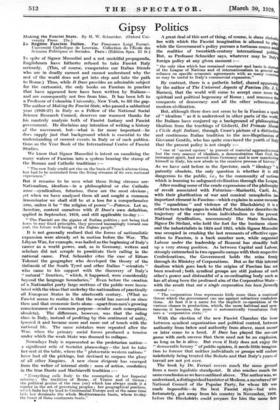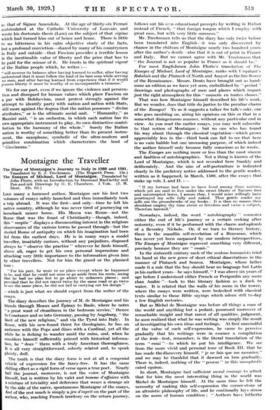Gipsy Politics
Lo Regime Fasciste Italien. Par Francesco Luigi Ferrari. Universite Catholiquo de Louvain. Collection de l'Eeole des Sciences Politiques et Sociales. Paris : (Edition Spes. 25 fr.) IN spite of Signor Mussolini and a not unskilful propaganda, Englishmen have hitherto refused to take Fascist Italy seriously. (This, of course, exasperates our Italian friends who arc in deadly earnest and cannot understand why the rest of the world does not get into step and take the path to Rome.) Thus, while 11 Duce provides an admirable subject for the cartoonist, the only books on Fascism in practice that have appeared here have been written by Italians— and are consequently not free from bias. It has been left to a Professor of Columbia University, New York, to fill the gap. The author of Making the Fascist State, who passed a sabbatical year (1926-27) in Italy as a Fellow of the National Social Science Research Council, deserves our warmest thanks for his masterly analysis both of Fascist fantasy and Fascist government. He disclaims any intention of writing a history of the movement, but—what is far more important—he does supply just that background which is essential to the understanding of current events in Italy or of such publica- tions as the Year Book of the International Centre of Fascist Studies.
We know that Signor Mussolini is intent on canalizing the many waters of Fascism into a system bearing the stamp of the Roman and Catholic traditions :-
" The new Italy could not rise on the basis of French abstractions, but had to be nourished from the living streams of its own national experience."
But it remains to be seen what those living streams are. Nationalism, idealism—in a philosophical or else Catholic sense—syndicalism, futurism, these are the most obvious ; yet when we have analysed them all and sought a common lenominator we shall still be at a loss for a comprehensive term, unless it be "the religion of power "—Potenza. Let us, therefore, content ourselves with 11 Duce's own definition, applied in September, 1919, and still applicable to-day :- " The Fascisti are the gipsies of Italian politics ; not being tied down to any fixed principles, they proceed unceasingly toward one goal, the future well-being of the Italian people."
It is not generally realized that the forces of nationalistic expansion were already set in motion before the War. The Libyan War, for example, was hailed as the beginning of Italy's career as a world power, and, as in Germany, writers and scholars did not scruple to prostitute their calling in the
national cause. Prof. Schneider cites the case of Ettore Tolomei the geographer who developed the theory of the italianitli of the South Tyrol and other Italian " scientists " who came to his support with the discovery of Italy's 4' natural " frontiers, " which, it happened, were considerably beyond the language boundaries," Even before the creation of a Nationalist party large sections of the public were inocu- lated with the ideas that underlay the nationalism of practically all European States in the nineteenth century. (What no Fascist seems to realize is that the world has moved on since then and that economic facts alone--apartfrom men's growing consciousness of a common purpose—render such conceptions obsolete). The difference, however, was that the ruling Mass in Italy, instead of profiting by this sentiment of unity, ignored it and became more and more out of touch with the national life. The same mistakes were repeated after the War, when the primiry social forces produced a tension under which the weak State'was doomed to collapse.
Nowadays Italy is represented as the proletarian nation— a significant relic of Socialist phraseology—the last to take her seat at the table, where the " plutocratic western nations " have had all the pickings, but destined to surpass the glory of all other Empires. A new classe dirigente has emerged from the welter of internal strife : men of action, condottieri in the true Dante and Machiavelli tradition :- "Everything calls Italy to the resumption of her Imperial mission : the tradition of Rome, of Venice and of Genoa ; the political genius of the race (sic) which has always made it a master in the art of governing peoples ; her geographical position, which links her by land to Continental Europe and at the same time bids her dominate the whole Mediterranean basin, where to-day
tho heart of three continents beats." •
A great deal of this sort of thing, of course, is sheer rhetoric, fire with which the Fascist imagination is allowed to play,
while the Government's policy pursues a tortuous course am* the realities of twentieth-century international mit;
But, as Professor -Schneider says, whatever may be Italy, foreign policy at any given moment :— " the only idea which has remained constant and basic is chil of the League of Nations and of internationalism in general reliance on specific economic agreements with as many count as may be useful to Italy's commercial expansion."
By contrast, there is a pathetic belief, shared apparel• by the author of The Universal Aspects of Fascism (Mr. J.
Barnes), that the world will come to accept once more spiritual and political hegemony of Rome ; and renounce conquests of democracy and all the other refinements modern civilization.
, But, although there does not seem to be in Fascism a spark of " idealism " as it is understood in other parts of the world, the Italians have conjured up a background of philosophies! idealism from the teachings of Gioberti, Del Primal° Monde Civile degli Italiani, through Croce's picture of a distinctive and continuous Italian tradition to the neo-Hegelianism Giovanni Gentile, who has quite convinced the youth of Italy that the present policy is not simply :- " one of ' sacred egoism ' in pursuit of material aggrandizement but the very essence of idealism, a demonstration that God, the immanent spirit, had moved from Germany and is now manifesting himself in Italy, his new abode in the creative process of history."
As we have said before in the Spectator, such " ideology " is patently obsolete, the only question is whether it is still dangerous to the public, i.e., to the community of nations which is learning to safeguard civilization through the League.
After reading some of the crude expressions of the philosophy
of revolt associated with Futurism—Marinetti, Carl, de.,
with their glorification of war and comical xenophobia (as important element in Fascism—which explains in some measure the " squadrism " and violence of the Blackshirts) it is a relief to turn to the pages in which Prof. Schneider describes the trajectory of the curve from individualism to the present National Syndicalism, uncommonly like State Socialism. Signor De Stefani, who held the fort for the business classes and the industrialists in 1924 and 1925, while Signor Mussolini was occupied in crushing the last remnants of effective oppo- sition to Fascism, is a back number now, while organized Labour under the leadership of Rossoni has steadily built up a very strong position. As between Capital and Labour, strongly entrenched in two opposite camps with their respective
Confederations, the Government holds the reins firmly through its Ministry of Corporations. But so far this internal
dualism which goes back to the origins of Fascism has not been resolved ; both syndical groups are still jealous of each other's power and distrustful of a co-ordinating body such as has all along been the professed aim of the Corporative State— with the result that not a single corporation has been formally created :-
" The corporation thus represents little more than a continual threat which the government can use against refractory confedera- tions. At best it is a name for the implicit co-operation of the various classes in production, which, the more habitual and spon- taneous it becomes, the more it automatically transforms Italy into a ' corporative state.' "
With the election of the new Fascist Chamber the issue between syndieal organization and political control, between
authority from below and authority from above, must sooner or later come to a head. II Duce has played the see-saw game with such success that there need not be an explosion, as long as he is alive. But even if Italy does not enjoy the " democratic luxury " of public opinion, it needs little imagina- tion to foresee that neither _individuals or groups will endure indefinitely being treated like Robots and that Italy's years of travail are not yet over.
The book by Dr. Ferrari covers much the same ground from a more legalistic standpoint. It also reaches much the same conclusion as we have outlined above. The author was, we understand, a distinguished barrister at Modena, a member of the National Council of the Popular Party, for whom life was made impossible—in the best Fascist style—but who, fortunately, got away from his country in November, 1926, before the Blaekshirts could prepare for him the same fate
as that of Signor Amendola. At the age of thirty-six Ferrari matriculated at the Catholic University of Louvain and
wrote his doctorate thesis (Law) on the subject of that regime which had turned him out of house and home. There is little or no bitterness in his calm objective study of the facts, but a profound conviction—shared by many of his countrymen in Italy and outside—that Fascism provides a terrible lesson
in the inestimable value of liberty and the price that has to be paid for the misuse of it. He trusts in the spiritual vigour of the Italian people which, he writes :—
" will recover its balance after having learned to suffer, after having understood that it must follow the lead of its best sons while serving no man, and after having learned from experience that if it would possess liberty it must be worthy of so incomparable a treasure."
We for our part, even if we ignore the violence and persecu- tion and disregard for human values which place Fascism on a par with Bolshevism, must protest strongly against the
attempt to identify party with nation and nation with State, still more against the dogma that the nation possesses " divine attributes," or is the ultimate social unit. " Humanity," as Idazzini said, " is an orchestra, in which each nation has its own appropriate instrument to play, its own distinctive contri- bution to the harmony of the whole." Surely the Italian nation is worthy of something better than its present instru- ment, the saxophone, symbolic of the ultra-modern and primitive combination which characterizes the land of Giovinezza."



















































 Previous page
Previous page